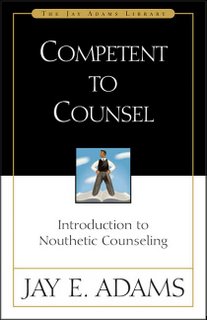 This was a really good book. I've also read Shepherding God's Flock, The Christian Counselor's Manual, and Ready to Restore by Jay Adams. I like his philosophy. Counseling is designed to change behavior and attitudes, into conformance with Scripture. The focus ought to remain on behavior and actions, since negative feelings of depression, guilt, sickness, or even mental illness, often results from bad behavior.
This was a really good book. I've also read Shepherding God's Flock, The Christian Counselor's Manual, and Ready to Restore by Jay Adams. I like his philosophy. Counseling is designed to change behavior and attitudes, into conformance with Scripture. The focus ought to remain on behavior and actions, since negative feelings of depression, guilt, sickness, or even mental illness, often results from bad behavior.Adams is quite hard on modern psychology. He sees it as usurping the role of the pastor/elder, based on false assumptions about sin, guilt, and the place of emotions in the self. I basically agree with this, though I think psychology does have some legitimate insight to give us. The problems start when that wisdom is applied in unbiblical ways in counseling. Adams' theme is that any Christian properly versed in Scripture is compentent to counsel another Christian through their problems.
Discussing this with a neighboring pastor, who majored in psychology, I realized that the issue is how much we can trust the wisdom of the world, to what extent we can "plunder the Egyptians" and use that wisdom, and to what extent it needs to be modified so as to not violate Scripture.
Does depression always result from sin? When sick, can you assume it's because there is sin to confess (James 5:14ff)? Not always. Sin is always present somewhere in one's life, and it has consequences that bring people in for counseling. There may be connections to feelings or sickness, and it is wise to look into them. At the same time, you don't want to end up being Job's counselors, who assumed he sinned, since bad things happened to him. I think there are times when depression comes about by a chemical imbalance brought on because the whole creation has been subjected to futility (Romans 8:20), not necessarily because of the individual's sin.
Adams' approach is quite directive and aggressive - counselors need to go after sin. When Scripture commands us to "admonish" each other as believers, it means we must confront others, warning, directing, guiding them back to safer paths of righteousness. I agree, but we don't want to be harping at each other all the time, either. The key is to have relationships of love and respect that are rooted enough to withstand the winds of differing opinions and confrontations, without toppling the whole tree (people walk away angry looking for another church). Those roots must be grounded in our union with Jesus Christ (Colossians 2:6-7; Ephesians 4:1-6).
While I tend to agree that some depression could be caused by chemical inbalances, to say so makes me uncomfortable. I say that it makes me uncomfortable because it seems that today the diagnosis of depression as a chemical inbalance removes all responsibility from the depressed person, ie. "It isn't my fault it is my brains fault and I can't do anything about that." Often, although not always, when I encounter depressed people they are depressed because of some big sin they are involved in that they know is wrong, but refuse to confess and repent of. What the current understand of depression as a chemical inbalance does, is give them an out so they don't really have to deal with the underlying problem of unbelief.
ReplyDeleteA book I want to read sometime is Blame it on The Brain as it deals with some of this.
So, while I do think there are times when chemical inbalance is the cause of certain problems, I think as pastors we need to be careful to not let that be an out for people.